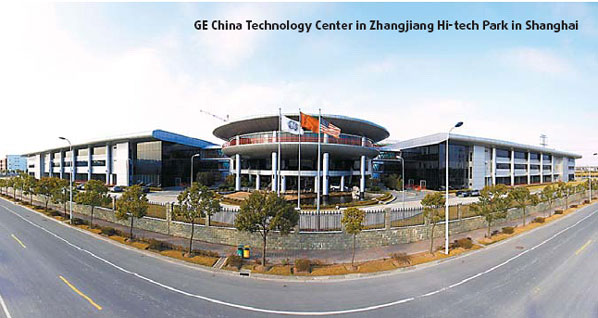


Nearly every major economic development in China has benefited General Electric, or GE, the multinational American technology and services conglomerate during its last 17 years in China. GE established its first joint venture in Beijing in 1991, when it opened GE Hangwei Medical Systems Co in Beijing.
But prior to its re-entry into China in 1991, GE was doing business as early as 1906. The first GE lighting plant in China was built in Shenyang, capital city of Northeast China's Liaoning province, in 1908. And the first coal power turbine generator installed by GE in China in 1921 was still in use in Shanghai until 2004.
But GE's first and biggest break in China came in 2001 when the company received a large order for gas turbines and China also began purchasing an increasing number of aircraft engines from GE.
"The year of 2001 is kind of key inflection point, when things really start to accelerate on the growth side," says Steve Bertamini, GE's chairman and CEO for North Asia and China.
Ever since its entry to China, the company has been expanding into many industries, including infrastructure, power generation, aircrafts, healthcare and financial services. In 2003, GE Plastics opened the $64-million China Technology Center in Zhangjiang Hi-tech Park in Shanghai, one of its four global research and development facilities.
Until 2007, plastic was once GE's largest business in China. As a leading global supplier of hi-tech plastics resin for a broad variety of industries including automotive, healthcare and others, GE Plastics' sales revenue exceeded $1 billion in China in 2005. GE sold the plastics business in 2007 to SABIC, (Saudi Basic Industries Corporation), one of the world's leading manufacturers of plastics, chemicals, fertilizers and metals, for $11.6 billion.
GE is also looking to expand its reach to financial services in China in the coming three or five years.
"The major gap we have today between this market and in the US are financial services," Bertamini says.
"Financial services, if you look at GE globally, are roughly 45 to 50 percent of our revenues, but we have very small base in China."
With private label credit and auto loans, GE's consumer finance operation, GE Money, is looking for a local partner to complement its global experiences, according to Bertamini. So far, since 2005 GE Money has worked with the Shenzhen Development Bank to provide credit card services.
"Financial service is still very early in China and this is a long game," says Bertamini.
According to the CEO, permission for foreign companies to buy major stakes in Chinese banks is the regulatory constraint that GE would like most to be removed.
"There are still a lot of restrictions on the ability for foreign companies to buy majority stakes," says Bertamini. "It's the number one area that will give us flexibility."
In view of the emerging aviation market in China, aircraft leasing is playing an increasingly important role in GE's business expansion.
"Aircraft leasing is a huge market for us," he says. GE owns 120 airplanes in China. "We lease to the major airlines, and we will see the aviation market continue to grow in China." he adds.
During the past decade, GE has also made great efforts to boost its branding in China. "I think in China you recognize a brand's reputation is very important," Bertamini says.
GE is also focusing on making a reputation for itself as an eco-friendly company.
"We would like people to associate GE with 'green' and as a company that is interested in environmental protection," he says.
Bertamini says the biggest environment related project GE has operated in China so far are water reuse and recycling systems and facilities. In 2004, GE set up the first facility that produces water treatment chemicals in Wuxi city of Jiangsu province, and is now expanding the facility to introduce advanced membrane technologies that are critical to the wasterwater treatment process.
As a worldwide partner of the Olympic games, GE is also to provide core technologies for China's first rainwater recycling system in a major public building at the National Stadium in Beijing.
To date, GE is involved in more than 335 projects related to the Beijing Olympic Games ranging from transportation, security, energy and water to healthcare and lighting.
Looking ahead, Bertamini says: "We are moving more to tier-two cities and even tier-three cities, because future growth is expected to be in the next ten or fifteen years, as people move from rural agricultural sectors to cities. This will create huge demand. You need more hospitals, more roads, more airports, power and more water. Those are all opportunities for companies to be very well positioned to take advantage of the huge demand."
(China Daily 05/03/2008 page6)













